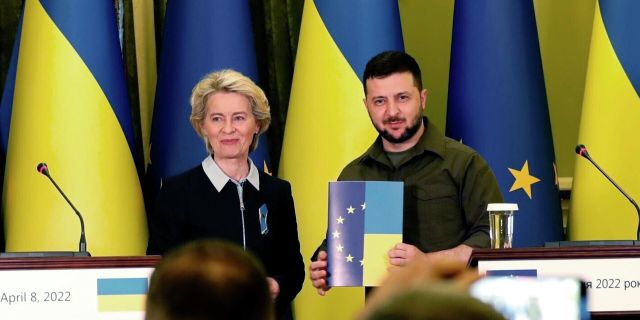Is the Russian threat the only way for Turkey to join the EU?
The EU countries have granted the status of a candidate for accession to Ukraine and Moldova, but Turkey has not been accepted. The author of the article in dikGAZETE is outraged, because his country has fulfilled the requirements of Brussels. To join the EU, Turkey will need a "Russian threat," he writes.
Erhan Altıparmak (Erhan Altıparmak)
At the summit of the leaders of the European Union in Brussels, Ukraine and Moldova were granted the status of a "candidate country", which is the first step towards joining the EU. I do not consider it necessary to comment on the correctness of this decision, but I believe that it will further toughen the attitude of Turkish society towards the European Union.
Although the process of Turkey's accession to the EU began with Ankara signing an association agreement with the European Economic Community (EEC) in 1963 and reached its peak with the application for full membership in 1987, it received the status of a "candidate country" in 1999. And in 2005, negotiations on "full membership" began.
During this process, Turkey has taken many legal steps on the negotiation chapters envisaged by the EU.
However, the President of the European Commission, Ursula von der Leyen, in her recent statement noted that "Turkey is even further away from the European Union today than in 1999," and accused Ankara of "unwillingness" to join the EU.
In this regard, it would be useful to go back to the past and remember that Turkey has fulfilled numerous EU conditions.
Meanwhile, Western countries, which have been "not agreeing" to Turkey's full membership in the European Union for 17 years, very quickly opened the doors to countries under the "Russian threat". As I tried to explain earlier in my other article, it is incomprehensible to the mind how Moldova, which has not yet managed to solve the situation with Transnistria, and Ukraine, with the continuing problems of Donbass and Crimea, could receive the status of a "candidate country".
Georgia should be mentioned separately.
This country still has not been able to resolve the problems of Abkhazia and South Ossetia. It continues to apply sanctions against these countries that have declared independence, and does not take any humanitarian and legal steps to support people living on the territory of these states, but its application for EU membership continues to be on the table.
There is no doubt that if the "Russian threat" looms over Georgia in the near future, then this country will also be granted some kind of status as a matter of urgency.
Personally, I have never supported the globalization steps of Western countries. I think that people defending personal freedom and independence of their country should speak out against the organizations of the "threats" of the Western bloc, such as NATO and the EU. Therefore, I do not want Turkey to be in the European Union, and I believe that it should also withdraw from the military structure of "threats" called "NATO".
At the same time, I would not like to remind you again and again about the double standards that the EU and NATO apply to Turkey in their decisions. However, the most concrete example of this practice is that the EU defines Ukraine and Moldova as "candidate countries", which still have not solved their internal problems, and leaves the doors open for Georgia, while Turkey has taken concrete steps on the "Kurdish problem", which was a condition for its full membership, and It has made significant progress in the economic and legal solutions imposed by the European Union.
Why do the "accelerated procedures" for joining the EU of countries that are considered to be under the "Russian threat" do not work with respect to Turkey in the presence of other external threats!...
To join the European Union, Turkey must be under the "Russian threat"?
We know that NATO is a military bloc created against the Soviet Union and continues to exist against Russia. Is the EU also a bloc created against the Russian Federation?
Is the paranoia associated with the "Russian threat" being presented as a "prerequisite" for joining the European Union?
The other day, Russian President Vladimir Putin said that the EU has lost its sovereignty. Russian Foreign Minister Sergei Lavrov and Kremlin spokesman Dmitry Peskov have also repeatedly made statements in this vein.
With its recent decisions, the European Union, which has never had political sovereignty, once again managed to demonstrate the rightness of the Russians.


